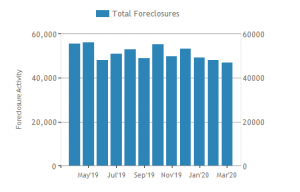Kara TaylorMay 26th,
2020ForeclosuresMost Recent Articles
Due to the economic impact of the Coronavirus, analysts predict a prospective rise in the number of foreclosures over the next several months. As such, as a real estate investor it’s wise to make sure you keep a close watch over changing trends in the distressed market. In this article, we explore how COVID-19 may impact foreclosures in the future and how you can ensure you stay alert to any changes in the market.
Coronavirus’ Impact on the Foreclosure Market
ATTOM’s Q1 2020 U.S. Foreclosure Market Report highlights that we saw 156,253 U.S. properties with a foreclosure filing in the first quarter of 2020. This is a 3% decrease from Q1 in 2019.
In addition, 46,800 U.S. properties were recorded with foreclosure filings in March 2020 – down 20% from March 2019 – the third consecutive month with a year-over-year decrease in filing activity in the U.S.
Kara TaylorMay 26th, 2020ForeclosuresMost Recent Articles
Due to the economic impact of the Coronavirus, analysts predict a prospective rise in the number of foreclosures over the next several months. As such, as a real estate investor it’s wise to make sure you keep a close watch over changing trends in the distressed market. In this article, we explore how COVID-19 may impact foreclosures in the future and how you can ensure you stay alert to any changes in the market.
Coronavirus’ Impact on the Foreclosure Market
ATTOM’s Q1 2020 U.S. Foreclosure Market Report highlights that we saw 156,253 U.S. properties with a foreclosure filing in the first quarter of 2020. This is a 3% decrease from Q1 in 2019.
In addition, 46,800 U.S. properties were recorded with foreclosure filings in March 2020 – down 20% from March 2019 – the third consecutive month with a year-over-year decrease in filing activity in the U.S.

Source: Realtytrac (an ATTOM Data Solutions company)
In addition, while US Congress has temporarily enforced deferments on mortgage payments, many may struggle to keep up with mortgage payments in the future due to the hit to jobs and financial savings.
Moreover, while several banks are suspending foreclosure, it’s unclear how long the majority of these will last, since the majority of institutions have not provided a suspension time frame.
However, as an investor, you’re likely aware of the ongoing contraction of the market for many years before the Coronavirus hit. Our Year-End 2018 U.S. Foreclosure Market Report, highlighted that foreclosure filings were 78% from the 2.9 million heights of 2010.
The Future of the Foreclosure Market
Industry analysts predict that after an extensive period of contraction, the number of foreclosures is predicted to grow rapidly next year.
Our chief product officer Todd Teta notes that the number of foreclosures could also see a sharp rise over the coming months due to the greater unemployment rates and financial difficulties due to COVID19.
Recent reports show that unemployment applications have risen drastically – with approximately 5 times the number of out-of-work Americans signing on than the previous record number of claims. These troubling economic factors may mean that many homeowners may unfortunately struggle to keep up with their monthly payments – potentially leading to a higher rate of foreclosures.
Why Invest in Foreclosures in the Current Climate
Due to the fallout of the current pandemic, many real estate investors are reluctant to invest. However, foreclosures may in fact be one of the smartest residential real estate investments to consider in current circumstances.
Foreclosures offer a cautious investment in light of the uncertain real estate market and fragile economic atmosphere – as we see hits to other property investment asset classes – such as commercial office space. In addition, newly foreclosed properties often require minimal renovation works, offering a higher ROI for you as an investor.
Stay Tuned-In to Shifts in the Foreclosure Market as a Real Estate Investor
As an investor, how can you ensure you’re aware of any changes in the distressed market as they unfold?
Ensuring you have accurate, up-to-date data on foreclosure trends is key. Many investors turn to ATTOM for data on U.S. foreclosures, as the leading provider of foreclosure and real estate data, offering the largest footprint of pre-foreclosure and foreclosure records, we provide a comprehensive, real-time overview of the distressed market.
This far-reaching realty data includes information on: Notice of Default (NODs), Lis Pendens (LIS), Notice of Trustee’s Sale (NTS), Notice of Foreclosure Sale (NFS), and bank real estate owned completed foreclosures (REOs). This data can help you keep an eye on developing trends in the market, preparing for the impending growth of the foreclosure market.
Preparing Yourself for Future Foreclosure Developments
Due to the economic impact of COVID19, we can expect to see a rise in foreclosed properties over the next several months. As an investor, is important to guarantee you’re always aware of any shifts in the market. With the help of ATTOM’s pre-foreclosure and foreclosure data, you can keep your eye on these developments and real estate market trends as they unfold.
Interested in finding out more about our pre-foreclosure and foreclosure data?
Contact ATTOM for Foreclosure Data Licensing Details
Contact RealtyTrac.com for Foreclosure Search and ListingsSource: Realtytrac (an ATTOM Data Solutions company)
In addition, while US Congress has temporarily enforced deferments on mortgage payments, many may struggle to keep up with mortgage payments in the future due to the hit to jobs and financial savings.
Moreover, while several banks are suspending foreclosure, it’s unclear how long the majority of these will last, since the majority of institutions have not provided a suspension time frame.
However, as an investor, you’re likely aware of the ongoing contraction of the market for many years before the Coronavirus hit. Our Year-End 2018 U.S. Foreclosure Market Report, highlighted that foreclosure filings were 78% from the 2.9 million heights of 2010.
The Future of the Foreclosure Market
Industry analysts predict that after an extensive period of contraction, the number of foreclosures is predicted to grow rapidly next year.
Our chief product officer Todd Teta notes that the number of foreclosures could also see a sharp rise over the coming months due to the greater unemployment rates and financial difficulties due to COVID19.
Recent reports show that unemployment applications have risen drastically – with approximately 5 times the number of out-of-work Americans signing on than the previous record number of claims. These troubling economic factors may mean that many homeowners may unfortunately struggle to keep up with their monthly payments – potentially leading to a higher rate of foreclosures.
Why Invest in Foreclosures in the Current Climate
Due to the fallout of the current pandemic, many real estate investors are reluctant to invest. However, foreclosures may in fact be one of the smartest residential real estate investments to consider in current circumstances.
Foreclosures offer a cautious investment in light of the uncertain real estate market and fragile economic atmosphere – as we see hits to other property investment asset classes – such as commercial office space. In addition, newly foreclosed properties often require minimal renovation works, offering a higher ROI for you as an investor.
Stay Tuned-In to Shifts in the Foreclosure Market as a Real Estate Investor
As an investor, how can you ensure you’re aware of any changes in the distressed market as they unfold?
Ensuring you have accurate, up-to-date data on foreclosure trends is key. Many investors turn to ATTOM for data on U.S. foreclosures, as the leading provider of foreclosure and real estate data, offering the largest footprint of pre-foreclosure and foreclosure records, we provide a comprehensive, real-time overview of the distressed market.
This far-reaching realty data includes information on: Notice of Default (NODs), Lis Pendens (LIS), Notice of Trustee’s Sale (NTS), Notice of Foreclosure Sale (NFS), and bank real estate owned completed foreclosures (REOs). This data can help you keep an eye on developing trends in the market, preparing for the impending growth of the foreclosure market.
Preparing Yourself for Future Foreclosure Developments
Due to the economic impact of COVID19, we can expect to see a rise in foreclosed properties over the next several months. As an investor, is important to guarantee you’re always aware of any shifts in the market. With the help of ATTOM’s pre-foreclosure and foreclosure data, you can keep your eye on these developments and real estate market trends as they unfold.
Interested in finding out more about our pre-foreclosure and foreclosure data?
Contact ATTOM for Foreclosure Data Licensing Details
Contact RealtyTrac.com for Foreclosure Search and Listings







